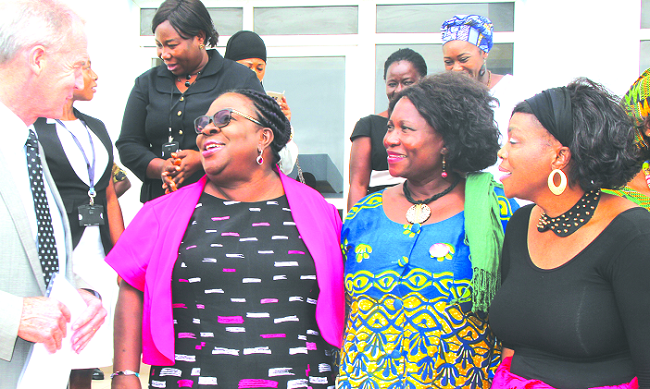
Workshop equips participants with gender-sensitive skills
The Women, Peace and Security Institute (WPSI) is organising a three-day training workshop in Accra to equip participants with the skills and tools necessary to undertake domestic election observation with a gender lens within the context of a gender-sensitive election observation.
The workshop is being held within the framework of the WSPI 1325 Communication Network (WPSI CommNet).
It also aims to contribute to a better understanding of the dynamics and factors that affect women’s participation in politics and help to identify gaps and challenges that have implications for the success or otherwise of political and public issues.
In attendance are the women’s organisers of the Convention People’s Party (CPP), Hajia Ayisha Sulley Futa; the National Democratic Party (NDP), Madam Peace Aryee; the People’s National Congress (PNC), Madam Janet Nabila; the Progressive People’s Party (PPP), Madam Vivian Tetteh, and some representatives of the diplomatic community and development partners.
Addressing the participants in the opening ceremony, the Commandant of the Kofi Annan International Peacekeeping Training Centre (KAIPTC), Air Vice Marshall (AVM) Griffiths Santrofi Evans, said the role of women in building strong and stable families could not be underrated.
He added that “women contribute to the national economy, play the role of peace advocates and actors in preventing and managing conflicts and also promote peaceful democratic elections”.
He said as impressive as the achievement of women in various public and private institutions might seem, there were persistent social patterns and attitudes that significantly inhibited women’s full access, representation and participation in public life.
He mentioned, for instance, that whereas women accounted for an estimated 20 per cent of parliamentary seats in the First Republic, they occupied less than 10 per cent of seats in the current legislature.
“This is far below the minimum 30 per cent threshold recommended by the United Nations. The low number of women in Parliament can have implications for legislation that adequately reflects their interests and priorities,” he said.
He stated that giving women greater access and representation in politics and governance would allow their potential and perspectives to be brought to bear on our democratic process.
Continuous support
The Australian High Commissioner to Ghana, Mr Andrew Barnes, stated in his address that Australia remained committed to supporting international efforts to put women at the top of international and national development agenda.
To show this commitment, he said the commission recently hosted a strong and diverse group of female politicians and gender advocates for a rich discussion about ways to promote women’s participation and representation in politics.
“It is my firm belief that promoting gender-inclusive participation in all stages of the electoral system forms an integral part of this important democratic process,” he said.
The various women’s organisers also urged participants to put their various party colours aside and strive for the voice of women to be heard in all spheres of life.
The WPSI serves as a knowledge centre for expanding technical capacity, training and policy research as well as analysis on women, peace and security.
